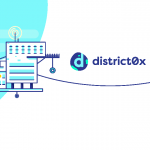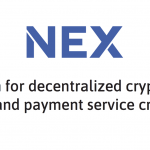Decentralized identity solutions were a hot topic at Consensus 2017, a popular Bitcoin and blockchain conference event held in New York City. One of the most anticipated and full-fledged solutions presented is Civic, which was debuted by Gyft co-founder, venture capitalist, and Shark Tank South Africa star Vinny Lingham.
Civic’s application looks and works like a digital wallet, but instead of money, it secures personal information, while allowing users to selectively share it. The Civic app offers a variety of ID-aware services, from password-free website logins to storing important data like healthcare records.
Basically Civic validates your personal information and identity, stores it on your mobile phone and only you can see or use that information. The information can then be shared directly with companies and individuals, which can confirm the data by referring to Bitcoin’s blockchain. This decentralized approach to identity storage and retrieval creates a bridge between real-world and cyber credentials, according to the startup’s website.
Three levels of verification
Civic offers three different levels of verification in their app. The first, called Private Login, is a simple, pseudonymous ID, primarily for websites and other non-vital services. The second type, called Low Level, includes an email address and phone number for common uses like e-commerce websites.
The third is the Full Know Your Customer (KYC) Level, and includes state-approved identification like address, social security, and other information found on drivers licenses and passports. Designed to be approved by each user’s local government and given their stamp of authenticity inside the app, this feature is only available in the US for now, but with more countries coming soon.
Applications
1. Protecting consumers from data theft
The primary focus of Civic was protecting consumers from data theft. If Lingham is correct, protecting everyone from identity theft could still be Civic’s killer app. It would, by default, keep all of your identity data on your phone and out of online databases, saving consumers from being among the tens of millions of victims of third-party data theft.
Vendors check in with the blockchain, and not a third-party service to verify the data in front of them at the time, so the ‘honeypot’ of user information no longer exists using Civic. The data is never stored on Civic’s servers.
If Civic was to ever get hacked, your information would never be released because they just don’t have it. Companies like Facebook are eclipsing nations in their control of identity. Blockchain based identity systems like Civic are critical.
2. Allowing consumers to build up a new type of credit profile.
Another interesting benefit is that the platform would allow consumers to build up a new type of credit profile. As the app is used, it builds up a trust profile, and companies offering any type of credit can rely less on expensive credit-checking firms like Experian, Equifax, and TransUnion.
3. Allowing users to log into any service, both offline and on.
Civic’s ultimate goal is providing a platform that allows users to log into any service, both offline and on, with smartphones alone. To this end, Civic has its’ own protocol called ChainAuth. The protocol is a new alternative to OAuth, which is used by thousands of companies including Google, Facebook, Microsoft and Twitter.
OAuth is an open standard for access delegation, most commonly used as a way to allow internet users to grant websites and applications access to their personal information, without handing over their passwords. Using Bitcoin’s blockchain as the only third party, ChainAuth is a far more private solution, according to Civic.
Availability
The app is now available for download for iTunes worldwide. Outside of the US, the service is only for ‘basic’ accounts for the time being, which verify your email address and phone number.
In the US, residents can additionally now sign up for the full-KYC, ‘verified’ accounts, which need a full verification of your name, address, and a social security number. Civic will be adding additional countries for verified accounts later this year.
Civic (CVC) Token.Overview
Current coin Value: $0.613330.
Market Cap: $208,532,200.
Total Supply: 1,000,000,000 CVC.
Circulating Supply 340,000,000 CVC.
CVC is an Ethereum-based token used by service providers that are looking to acquire information about a user. These can make a payment in CVC. The smart contract system employed will then see funds delivered to both the validator and the identity owner (user).
Validators receive CVCs when other participants utilize their attestations to prove identities. Users receive CVCs for providing their data more securely and privately through the ecosystem. All categories of participants can utilize CVCs for identity-related products and services provided by Civic and third parties through the ecosystem.
CVC ICO
The sale of Civic tokens, or the CVC crowdsale commenced on June 21 at 9am EDT. The CVC tokens priced at $0.10 per token were sold in purchase tiers ranging from $50 to $25,000 with BTC and ETH being the only methods of payment to be accepted during the crowdsale.
Token Sale Terms.
Maximum cap on crowdsale: $33 million.
Total token supply: 1 billion (1,000,000,000) CVC, of which:
• 33% sold in the token sale.
• 33% retained by Civic.
• 33% allocated for distribution to incentivize participation in the ecosystem.
• 1% to cover token sale costs.
Purchase methods accepted: BTC and ETH.
What is the Potential Value of one CVC coin?
Civic has a game plan now it all depends on how well they implement it and how widely accepted their tech will be. It’s a brilliant idea: with uses everywhere from background checks, flights, hotels, pharmacy’s, Dr. offices even online shopping and verification on websites, banks, Uber’s and ride sharing.. now it just depends on if those places will accept the idea and use it and if people will decide to use it. They likely will because it saves time and time is money. Anything that makes things quicker and easier is usually is usually widely accepted.
Exchanges
• HitBTC
• shapeshift.io
Wallets
• ERC20-compatible wallet of choice
Team
Vinny Lingham, CEO
Vinny is a serial entrepreneur who previously founded the digital gift card platform, Gyft, which was acquired by First Data Corporation in 2014. After over a decade of experience in e-commerce, he realized that no-one had a universal solution to tackle identity fraud for consumers.
Jonathan Smith, CTO
Jonathan has more than 15 years of experience in banking and technology advisory. After a successful career in some of the most complex and security sensitive environments, Jonathan brings his talent for technology leadership, innovation and delivery to the world of digital identity.
Conclusion
The rise in security breaches and data theft has resulted in identity verification becoming a very crucial part of any process. It is estimated that in 2016 alone, 15.4 million adults in the U.S. were victims of identity fraud resulting in a loss of $16 billion, while globally almost 1.1 billion identities were stolen last year. It has been reported that personal identity information is the most common form of data stolen. Given such problems are growing at a fast pace, a blockchain-based solution to secure and protect identities by Civic may be able to make a difference. As Civic is adopted by more and more entities, its token may be the next big thing in the cryptocurrency space.
[currencyprice currency1=”cvc” currency2=”usd,eur,btc”]
[currencygraph currency1=”cvc” currency2=”usd”]























